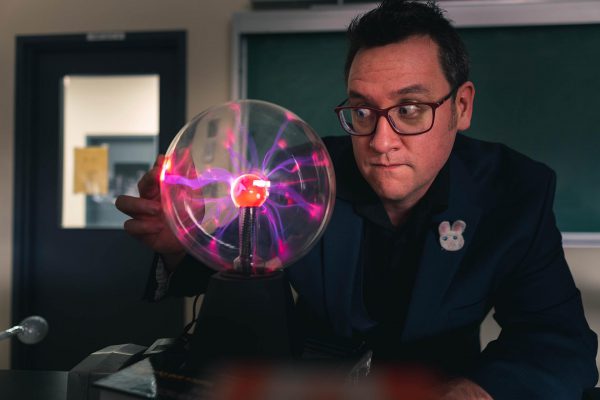Dr. Ben Tippett teaches Math, Physics, and Astronomy at College of the Rockies. He also has an impressive side-gig as the host of a popular podcast called The Titanium Physicists Podcast, which is closing in on two million downloads and has welcomed a wide range of guests including Greg Proops of Whose Line Is It Anyway? fame.
“We’ve had so many fascinating people, from television producers, animators, authors, comic book illustrators, musicians, it runs the whole gamut,” Ben said. “Basically if someone strikes me as interesting, or better yet, if it is someone my wife finds interesting, I reach out to them. I’m always looking to impress my wife.”
After earning a Masters in Physics, and a PhD in Applied Mathematics, Ben taught at the University of New Brunswick and UBC Okanagan before deciding he wanted to live in the Kootenays. He joined the faculty at College of the Rockies in the fall of 2018, and continued his side-passion, The Titanium Physicists Podcast.
“When I started the podcast, about nine years ago, there was not much in the way of physics outreach that was accessible to the general public,” Ben said. “I was looking for a way to share really cool concepts with people who have an interest in them, but who don’t have a formal physics education.”
On his podcast, Ben tackles one specific concept along with two guest physicists. A third guest, a lay person without a physics background, acts as a stand-in for the audience, asking for additional clarification when needed. Ben hopes the fun, conversational tone of the discussions helps humanize the scientific community.
“There is a stereotype of scientists as unreachable academics with nothing in common with the general public,” he added. “The reality is, scientists come with a diversity of personalities and interests, just like those outside of the scientific community. They are not in their white towers promoting hidden agendas, they are your neighbours and they have interesting information they’re willing to share.”
Often physics discussions in the general population consist of a journalist attempting to translate information they do not have expert knowledge of. Alternately, experts have been known to present material using technical academic language not easily understood. This creates a barrier and gives the sense that higher level physics isn’t accessible to the general public. Ben does not believe that is true.
“There’s nothing so subtle in the world of physics that would make it so most people can’t understand,” he says. “So we get these cool people on the podcast and we are laughing and joking as we talk about these concepts, much like if we were having a conversation in a pub. That makes the information more relatable and most people are able to walk away with a better understanding.”
A lack of diversity in the physics community is a concern of Ben’s. He makes a conscious effort to always have at least one female physicist on each episode, includes representation from different cultures, as well as the LGBTQ+ community.
“In the past, scientists have been white, neuro-typical males,” he explains. “They were not females, they were not people with disabilities, or individuals of different ethnic groups. That is changing but there are still barriers that make accessing a physics education a challenge for some. Women, in particular, face many societal messages that they are not as capable of understanding math and science concepts. That is simply not true. There’s nothing inherently impossible about doing this type of work for any particular demographic. We try to put forward a more diverse cast of physicists, because that is a change I want to see happen in our field.”
The Titanium Physicists Podcast’s reach continues to grow. Ben was recently invited to attend, and record an episode at, the American Association for the Advancement of Science’s (AAAS) annual meeting in Seattle, Washington.
In addition to his podcast, and his busy teaching position, Ben has also authored several papers that connect physics concepts with pop-culture topics. Some highlights include The Unified Theory of Superman’s Powers, How does Spider-Man move so fast?, and Increasing Survivability During a Zombie Epidemic.
